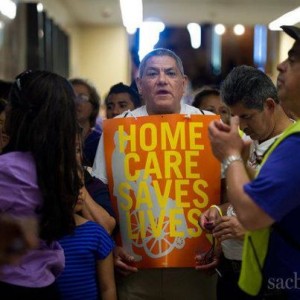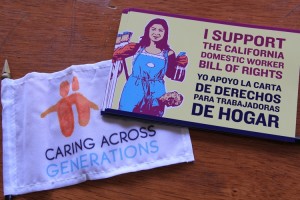This is not just a campaign, this is a movement
By Samuel Nelson, National Student Labor Action Project Intern on Caring Across Generations
“This is not just a campaign, this is a movement.”
 That sentiment was reiterated throughout the Boston Care Congress this past weekend. Over a hundred domestic and care workers, senior and disability advocates, immigrant rights activists, and students met this past weekend for the Congress to discuss, listen, and feel the spirit of the Caring Across Generations movement. Renowned labor leader and head of the National Domestic Workers Alliance Ai-jen Poo opened the Congress with energy and enthusiasm, and helped introduced the first panel. It was clear from the panel members what this movement was about: Vicente de la Rosa, a personal care aide with 1199SEIU, Sergio Gonclaves, a differently-abled gentleman with the Boston Center for Independent Living, Dafne Momongan, a domestic care worker with four jobs and a member of Matahari: Eye of the Day, and finally Joanne Prince, a fiery, energetic eighty-one year-old from the Multicultural Coalition on Aging. This movement really was not only across generations, but across cultures, race, gender, and class.
That sentiment was reiterated throughout the Boston Care Congress this past weekend. Over a hundred domestic and care workers, senior and disability advocates, immigrant rights activists, and students met this past weekend for the Congress to discuss, listen, and feel the spirit of the Caring Across Generations movement. Renowned labor leader and head of the National Domestic Workers Alliance Ai-jen Poo opened the Congress with energy and enthusiasm, and helped introduced the first panel. It was clear from the panel members what this movement was about: Vicente de la Rosa, a personal care aide with 1199SEIU, Sergio Gonclaves, a differently-abled gentleman with the Boston Center for Independent Living, Dafne Momongan, a domestic care worker with four jobs and a member of Matahari: Eye of the Day, and finally Joanne Prince, a fiery, energetic eighty-one year-old from the Multicultural Coalition on Aging. This movement really was not only across generations, but across cultures, race, gender, and class.
The small group discussions that followed gave us an opportunity to personally connect with attendees and showed the real diversity of the campaign and exactly how many different people are invested in the movement. There was a medical student from Boston University, a domestic care worker, a youth organizer in a low income section of Brooklyn, a tenant organizer; all coming with different experiences, backgrounds, and ideas about how to move forward with the movement and secure justice for all.
The workshops after that really got into not only the issues at hand, but the imperative to bring about change. Fighting for a fair economy, mediating with bosses, organizing against attacks on senior citizens, and fighting against racist immigration policy were all topics. What was built around those topics were not only a deeper understanding of the issues at hand, but a sense of urgency-an urgency participants may not have had before the workshops, but they certainly did afterwards.
 A few overarching themes emerged from the Congress, the first being that we are all in this together. Young, old, all genders, all races, disabled and not, this is an inter-sectional issue that must have involvement from all sectors of our society to succeed. Secondly, there is no randomness to attacks on the elderly, disabled, and workers. A Medicare “reform” in the House, a draconian immigration policy in Alabama, these are not isolated events. There is a concerted effort to strip workers’ rights, to destroy affordable health and home care for the elderly, poor, and disabled, and to expel immigrant workers who only wanted to better the lives of themselves and their families.
A few overarching themes emerged from the Congress, the first being that we are all in this together. Young, old, all genders, all races, disabled and not, this is an inter-sectional issue that must have involvement from all sectors of our society to succeed. Secondly, there is no randomness to attacks on the elderly, disabled, and workers. A Medicare “reform” in the House, a draconian immigration policy in Alabama, these are not isolated events. There is a concerted effort to strip workers’ rights, to destroy affordable health and home care for the elderly, poor, and disabled, and to expel immigrant workers who only wanted to better the lives of themselves and their families.
We as students are thus in a strategic position. We all have a story of needing to care for a family member. There are people who wish to go back to school, but can’t because a relative is in need of home care. With the a person turning 65 every eight seconds, we as students must join the movement, not just for seniors and the disabled, but for our own families, and our own futures. The Care Crisis effects us all, across generations. Look out for a Care Congress or Care Council near you and get involved. Together, as a united front, we can change care in this country.
